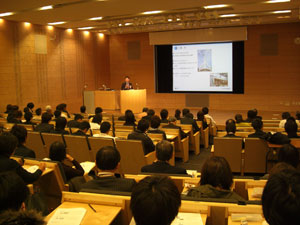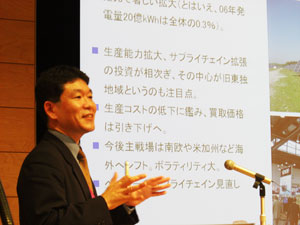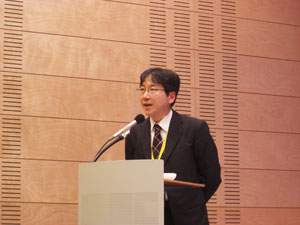
On November 29, 2008, starting at 3 PM, the third Lecture Commemorating the Founding of the Contemporary Policy Research Center of Josai University Educational Corporation was held with the overall theme: Issues of the Rapidly Expanding Global Economy in the 21st Century. The program included a remote broadcast to Josai International University, with participation by about 200 persons, including visitors to the hall.

Scene of the lecture

Mr. Keisuke Takegahara, the lecturer
The theme this time was “Problems of the Environment and Resource Inflation,” with a lecture by Mr. Keisuke Takegahara, manager of Public Solution Department, Development Bank of Japan.
Mr. Takegahara, with his extensive experience for the bank in Germany, developed his lecture while providing examples of reusable energy and recycling in the EU nations, especially Germany. This was part of a response to the question of whether the skyrocketing resource prices will become a trigger to promote development and spread of environmental technology (so-called clean tech).
Here are highlights of Mr. Takegahara’s speech: Firstly, it is generally believed that, if prices of existing energy resources (e.g. oil) should rise sharply, the price competitiveness for reusable energies (e.g., wind and solar energy) will increase, leading to an advance in development of alternate technologies as well as wide spread of the technologies. He then pointed out problem areas where things just do not go according to the theory while also indicating that the real issue is not sudden increase in resource prices but how to promote environmental technology in such an instable situation, as he particularly emphasized the importance of policy-making.
In Germany, although the geographical conditions are not ideal, we witness a spread in such reusable energies as wind power, solar power and biomass energy. Mr. Takegahara used concrete examples in showing how a key point is creating the systems that make good use of economic incentives. He then talked about the situation in Japan, which has a sufficient store of technical strengths and where effective creation of systems by means of government policy-making is required. For this reason, he said, he has high expectations for the Faculty of Contemporary Policy Studies and the Contemporary Policy Research Center.

Mr. Masaaki Ishii, the lecturer on behalf of Josai University, delivers a summary.
In closing, Mr. Masaaki Ishii, a lecturer in the Faculty of Contemporary Policy Studies, made a summary of the lecture while confirming how it is crucial to understand the importance of creating systems through policy-making and to introduce concrete and detailed incentives in response to the individual steps in spread of technology.
In this lecture, it was pointed out that, in addition to resources, investment in environmental technology is already being considered as a target of speculation. It became clear that not only sub-prime loans but many other things have become a target of speculation money.
By means of these three lectures, attendants were able to arrive at a common understanding that it is not a matter of understanding the situation simply as a problem concerning skyrocketing prices but that an important requiring urgent solution is a response to the rapid price fluctuation by a flow of investment money. You could say that this was a major achievement of this lecture commemorating the founding of the Contemporary Policy Research Center.

